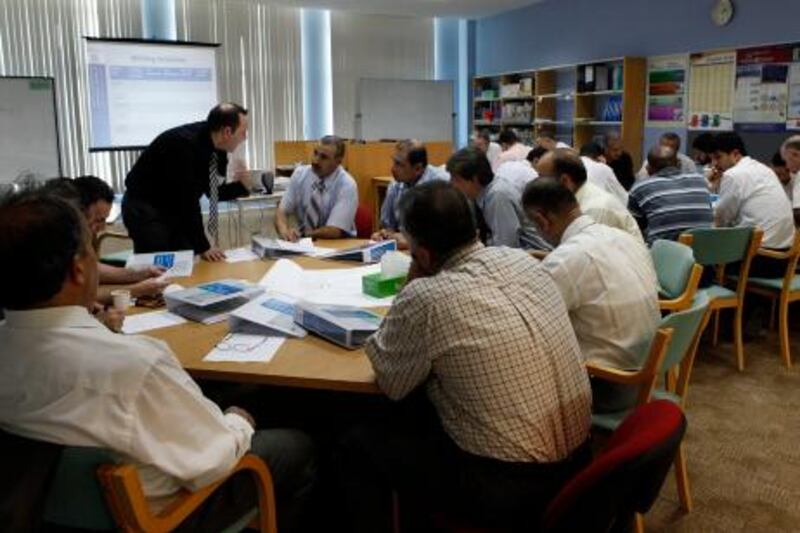DUBAI // Experts are calling for a new teacher recruitment policy to raise the quality of teaching in public schools.
The government education system for Emiratis relies heavily on Arab expatriates, many of whom are not properly trained as teachers.
According to the Ministry of Education more than 1,460 public school teachers, Emirati and expatriate, do not hold a university degree.
"There needs to be a teacher licensing procedure in place to enforce minimum standards, as well as raise the profile of the profession," said Dr Abdalla Al Amiri, the adviser to the Minister of Education.
That means teachers would need an education degree, qualifications in the subject they teach, experience and proficiency in Arabic and English.
Ian Whitman, the head of the Programme for Co-operation with Non-Member Economies, said the main issue was loss of respect for the profession in communities.
"Teachers used to command respect similar to priests and imams, but they do not have the same status any more," said Mr Whitman, whose programme runs under the Directorate for Education of the Organisation for Economic Co-operation and Development.
"The success of good performing education systems around the world lies in their community's faith in the teachers."
Teachers are often motivated by job satisfaction rather than pay - a lesson well learnt by Finland, which has some of the highest ranking schools.
"The opportunity to get professional training and development sessions is very important to keep them going," Mr Whitman said.
A project initiated at the Sharjah Higher Colleges of Technology last year found many teachers lacked training. About one in five state school English language teachers needed more training.
Dr Christina Gitsaki, the chairwoman of the UN Educational, Scientific and Cultural Organisation programme that launched the project, said the teachers had a bachelor's or master's degree but had not done any practical training in the classroom.
Most Arab expatriate teachers are from Egypt, Syria and Jordan, where such training is not necessary to qualify.
The answer, Dr Gitsaki said, was professional development courses.
Many teachers in the capital's public schools had not taken any such courses, according to a survey conducted by the Abu Dhabi Education Council (Adec) last year.
More than half (51 per cent) felt such workshops were seldom conducted and rarely followed up.
Dr Gitsaki is clear that her project, which has trained more than 200 public school teachers, has helped.
"Before the courses the teachers were using nothing but the textbook material," she said. "In my follow-up sessions, I found teachers applying what they had learnt.
"They were making their own resources and games. They did not mind putting in the extra efforts to create activities for their lessons."
Al Maghoury Mohammad, a teacher at Al Shahba Public School in Sharjah, said the sessions helped teachers to make learning more exciting.
"Introducing new activities has made lessons attractive, like asking children to narrate a holiday experience and introducing topics from there," Mr Mohammad said.
"In 10 minutes all the boys are paying attention and actually completing their work."
Mr Mohammad, who is from Egypt and has been teaching for 30 years, said he wanted more courses on finding online resources.
"If we can use videos it will be more fun for them," he said.
But more fun is not enough for everyone. Abdul Hanif, a public school teacher from Fujairah, has more concrete rewards in mind.
"For teachers who improve their skills … there should be a career progression scheme, which would include a senior position as well a licensing with a grade system," Mr Hanif said.
"It would encourage them and would also result in better salaries."
[ aahmed@thenational.ae ]






